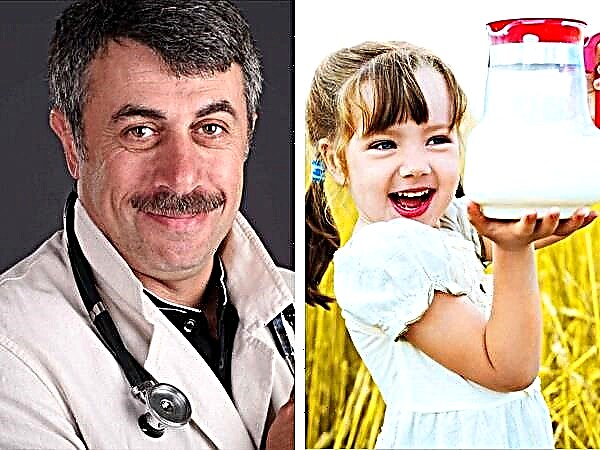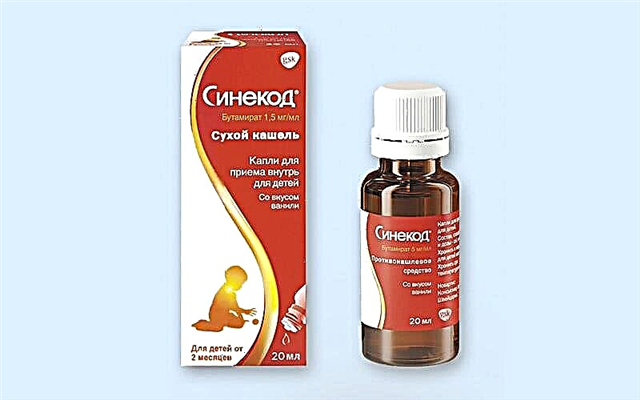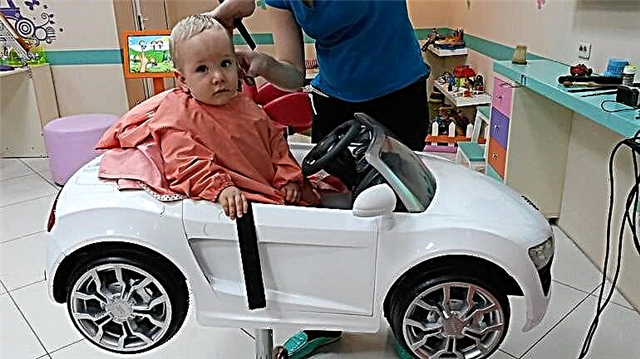
Advertising photos often contain images of red-cheeked, laughing babies. However, in reality, when a baby's cheeks turn red, parents are usually not overjoyed. Immediately, suspicions begin that something has not been eaten or drunk, the child begins to be limited in complementary foods, the breastfeeding mother immediately sits down on a severe diet. But often the reason for this phenomenon lies not even in nutrition. Evgeny Komarovsky, a well-known practicing pediatrician and author of books on children's health, tells about why babies' cheeks turn red and what parents should do if this happens.
Doctor Komarovsky about the problem
Redness of the cheeks is a complaint so frequent that this problem can be safely put on one of the first places among the problems of the first year of a child's life. Evgeny Komarovsky advises to consider several main causes of this skin phenomenon.

Overfeeding
The most common cause of red cheeks in a child is not an allergic reaction to a particular product, as mothers and grandmothers think. Redness is the body's response to overfeeding. Komarovsky claims that this is an external manifestation of the internal process that takes place inside the baby, when he is given more food than he is able to digest.
There are not so many enzymes accumulated in the child's body, and therefore the remaining undigested food simply rots in the intestines and comes out with feces. In the process of decay, decay products enter the bloodstream through the intestinal wall, which stain the baby's cheeks red.

Artificial children are most susceptible to overfeeding. While their peers, who feed on mother's milk, diligently suck their lunch from their breasts, they naturally have a feeling of satiety. A baby who eats from a bottle doesn’t work hard to suck the mixture and therefore eats faster. The feeling of fullness will come only 10-15 minutes after the end of the meal, as a result, the child will always suck out the excess amount that he will not be able to digest.
Komarovsky sees the way out in buying nipples with a very small hole for bottles, then the baby will have to work hard before he eats the amount of the mixture assigned to him.

Allergy
If the cheeks turn red with enviable regularity and the “culprit” in this trouble is still unsuccessful to track the food product, Evgeny Komarovsky recommends considering the option of contact allergy. Naturally, not independently, but in a friendly tandem with an allergist. With such an unpleasant phenomenon, the cheeks can not only turn red, but also become covered with a rash or crusts. In this situation, the worst enemy of mom and baby is chlorine. You need to go through the entire supply of household chemicals and, without a doubt, throw away everything that contains even the slightest hint of chlorine.
Dr. Komarovsky will tell you more about allergies in the video below.
Remember that the water in the tap is also chlorinated for disinfection, and therefore a child prone to contact allergies should be bathed in boiled water. All washing powders, including adults, must be replaced with hypoallergenic detergents for washing children's clothes. They should wash everything - from children's T-shirts to bedding for parents. Always keep ready a robe made of natural fabric, washed with baby powder, which should be asked to put on everyone who wants to take the baby in their arms (after all, it is not known how your grandmother or your friend washes their things at home!).


After washing, all things must be rinsed in pre-boiled tap water. You should carefully look at all toys, and with a merciless hand get rid of those that have a specific chemical smell, large soft toys, or accumulate a lot of dust. You need to leave only high-quality toys that can be easily and simply wiped every other day with water and baby soap and dried.
Nutrition
The effect of food on red cheeks shouldn't be underestimated either, Komarovsky says. This is often the case with cow protein allergies. In mixtures, especially adapted ones, the manufacturers "neutralized" it. But pasteurized milk, which is sometimes given to children after six months, may well cause an inadequate reaction of the body. A protein that is initially foreign to the child's immunity is called an antigen protein. It is not just not digested, the body begins to produce antibodies against it, which results in red cheeks.
Komarovsky advises to replace cow and goat milk in this situation with infant formula by age (No. 1 to 6 months, No. 2 - from six months), with severe redness - you can give the child sorbents (Enterosgel, Polysorb, etc. .).

Air
Respiratory allergy is most often manifested by a runny nose or allergic conjunctivitis, however, sometimes it is accompanied by redness of the cheeks and chin. In this case, you need to eliminate the source of the allergy as soon as possible and consult a doctor for an explanation of further actions. As a rule, according to Evgeny Komarovsky, it is enough to just eliminate the allergen.

Atopic dermatitis
If the cheeks turn red, and other parts of the body also redden, and this happens often, then one can suspect atopic dermatitis, which is popularly called diathesis. It, as a rule, manifests itself as a result of exposure to both internal and external factors. In other words, the antigen protein acts from the inside, and some irritating factors (such as chlorine in water) - from the outside.
To correct the situation, it is imperative to consult a doctor, as well as exclude external stimuli (by the methods described above) and adjust the diet. In some cases, symptomatic treatment with antihistamines, hormonal drugs may be needed.

According to Evgeny Komarovsky, diathesis disappears with age in the overwhelming majority of young patients. As immunity develops, as the digestive system and the metabolic system “debug”.
Tips
- Do not overfeed. Let him eat less, it will be better absorbed.
- Avoid contact with chlorine and "adult" detergents and washing powders.
- Medications for contact allergies should be used only with a doctor's prescription, so as not to harm the child even more. If red cheeks are not very troubling, it is best not to use medications at all. If the itching is severe and the child is constantly scratching them, you can use "Fenistil" or undergo treatment with hormones, if the allergist, after conducting the classic tests, considers it appropriate.
- Do not give cow or goat milk.
- A child with such a problem does not need to buy bright T-shirts, hats and pants. Textile dyes quite often cause contact allergies in especially sensitive children. The best choice in this situation is white shirts and pants.
- It is necessary to create optimal conditions for the child in the house. Air temperature - 18-20 degrees, air humidity - 50-70%. It is necessary to ventilate the room more often, do wet cleaning. Avoid overheating and sweating. Sometimes these measures alone are enough to stop reddening the cheeks.
- Children who tend to react with red cheeks should not be given too many medications... Antibiotics, antivirals, drops from the common cold and cough syrups can all trigger drug allergies. Therefore, medicines for such babies are given only in exceptional cases, strictly according to the justified prescription of a doctor.
- If a child's cheeks turn red, and all of the above reasons were not confirmed, this can only mean that the allergen could not be found. ABOUTPay attention to this: food for fish, aerosols, perfumes for mom and dad, insect repellent, domestic cats and dogs, house dust, plants, especially flowering, nuts, raisins, furniture coating in the apartment.
- It is necessary to monitor the bowel movement. A child with a tendency to reddening of the cheeks should not have constipation. An empty intestine greatly facilitates the condition for any type of allergic reaction. If constipation occurs (especially often children who are bottle-fed), you should definitely consult with your doctor to jointly determine the most gentle and safe way to solve this delicate problem.
- In no case should you treat a child's red cheeks with folk methods, says Komarovsky. As already mentioned above, the child's body is able to restore the ability to balance all processes in it on its own, and therefore this problem is not for life, the child will outgrow it. But the "healing" that parents and grandmothers are able to achieve in the process of looking for a remedy for reddening of the cheeks can "backfire" in an adult state. Not to mention some folk remedies, which by themselves will do much more harm than any atopic dermatitis.




